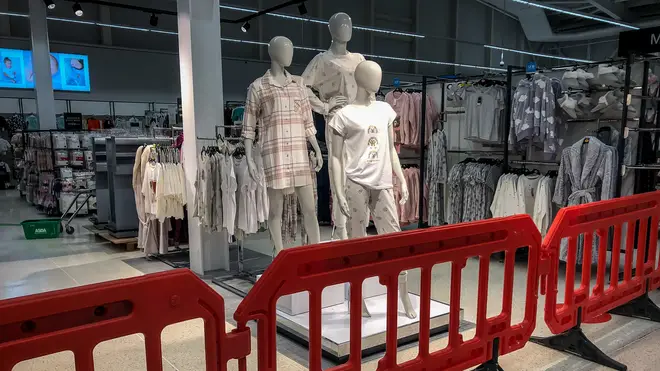
Ali Miraj 1pm - 4pm
27 October 2020, 20:13 | Updated: 27 October 2020, 20:16

The Welsh Government has provided an updated list of goods that retailers can sell during the firebreak following confusion over what are considered essential items.
More than 67,000 people have signed a petition to the Welsh Parliament calling for the ban on non-essential items to be immediately reversed.
On Tuesday, the Welsh Government said it had "positive discussions" with essential retailers, representative groups and trade unions over the rule.
Shops and supermarkets that are allowed to remain open during the lockdown, which is due to end on 9 November, can now sell 10 types of products, which include baby clothes and nappies.
The new regulations come after a Tesco shopper was unable to buy sanitary pads because it was deemed unessential.
Read more: Tesco apologises after suggesting sanitary products were 'non-essential' in Wales

First Minister Mark Drakeford announces new restrictions in Wales
A spokesman said the Government had "clarified that a sensible system should be introduced" in which customers can ask to buy non-essential items by exception under the regulations.
"We are hopeful this provides a workable solution for retailers and customers," he said.
"However, we cannot move away from the central principle that retailers must restrict the sale of non-essential goods for the duration of the firebreak.
"We continue to work closely with the sector and would stress that these restrictions are in place to stop the spread of coronavirus and save lives.
"We are asking the public to continue to support the effort by restricting unnecessary journeys and shopping."
Read more: Covid-19 antibodies 'only last for months', study finds

Alun Cairns on Welsh Government's lockdown measures
In supermarkets, 10 types of product can be sold.
Food and drink is allowed, as well as products "ancillary to the sale of food and drink" including disposable items used to prepare and store food such as kitchen foil, food bags and cling film.
Basic products necessary to prepare and eat food and drink are also able to be sold.
Products for washing clothes and for cleaning and maintaining the home, including batteries, light bulbs and fuel, are allowed.
Supermarkets can sell toiletries and cosmetic products, including toilet rolls and sanitary products, as well as pharmaceutical products and baby products including equipment, clothes and nappies.
Newspapers and magazines are allowed, as well as stationery and greetings cards, pet food and other pet supplies, and products for the maintenance of bicycles and cars.
Earlier on Tuesday, retailers called for the ban to be relaxed to allow customers "to make their own decision".
Read more: Number of deaths involving Covid-19 rises for sixth consecutive week

Wales to enter 'fire break' lockdown to help stop rise of Covid-19
Groups representing supermarkets made a series of recommendations to Welsh ministers following confusion over what can and cannot be sold during the 17-day firebreak period.
In a joint statement by CBI Wales, the Welsh Retail Consortium and the Association of Convenience Stores, they called for the Welsh Government to agree to the proposals to "resolve the confusion".
"We recommend the individual customer is trusted to make their own decision as to whether a product is non-essential or not, taking into account the notices displayed throughout the store and their immediate needs," they said.
"If the customer goes ahead with the purchase of the item the final liability ought to rest with the customer."
It said this would mean non-essential items were not removed from shelves or cordoned off.
Large notices would instead be placed in front of the products and in communal spaces informing shoppers of the Welsh Government's regulations.
In-store announcements and social media messaging could be used to advise customers to put off buying non-essential items, the statement suggested.
Retailers could also remove special in-store promotional displays of non-essential items in order to minimise browsing time and "avoid triggering a non-essential purchase".
On Monday, Wales' Health Minister Vaughan Gething said it would be made clear that supermarkets could use their own discretion to sell non-essential items to those "in genuine need".
He told a press conference he was "very saddened" to hear of an exchange involving Tesco on Twitter, in which it was wrongly suggested that sanitary products were non-essential and could not be sold.
It later emerged that an aisle selling the items at one store in Cardiff had been cordoned off to allow for a police investigation following a burglary.
The Welsh Government has said the rules are both about limiting transmission of coronavirus as well “Following positive discussions with essential retailers, representative groups and Trades Unions" as being fair to non-essential retailers who have had to close during the firebreak.
Under the firebreak lockdown, which began at 6pm on Friday, non-essential retail including clothes shops, furniture stores and car dealerships are closed.
Shops selling multiple types of product can stay open but can only sell essential items.
On Tuesday, a further 1,207 people tested positive for coronavirus, bringing the total number of confirmed cases in the country to 45,046.
Public Health Wales said seven people with Covid-19 had died, with the total number of deaths since the beginning of the pandemic rising to 1,790.
Listen & subscribe: Global Player | Apple Podcasts | Google Podcasts | Spotify